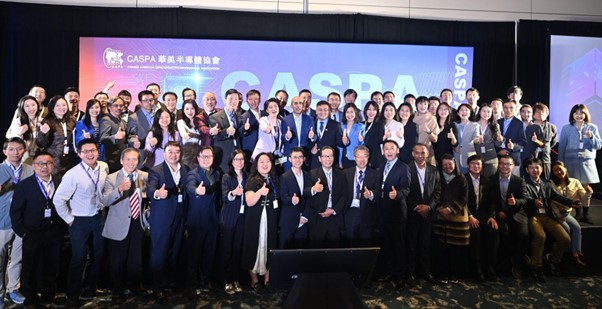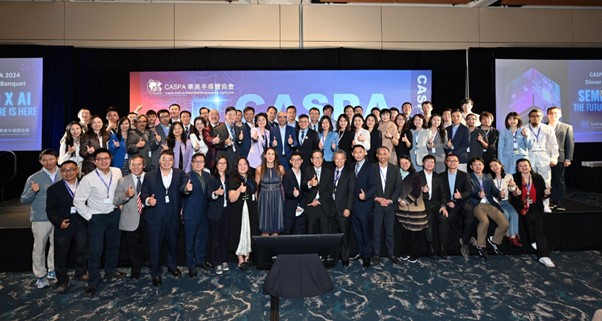
On October 19, 2024, the Chinese American Semiconductor Professional Association (CASPA) held its annual conference at the Santa Clara Convention Center. The theme of this year’s conference was “Democratizing AI: How the Semiconductor Industry Powers AI as a Universal Utility”, aiming to explore how semiconductor technology can reduce the cost of AI, thereby promoting its widespread use. The goal is to break the limitations of AI being restricted to large tech companies and research institutions, enabling small and medium-sized enterprises and even individual developers to leverage AI to enhance productivity and drive industry transformation. Keynote speakers included Richard Ho, Head of Hardware at OpenAI; Alessandra Costa, Senior Vice President of Synopsys; Chloe Ma, Vice President of ARM; Jason Cong, Professor at UCLA; Colley Hwang, President & CEO, DIGITIMES; Vice President of Cadence; and Dan Armbrust, Co-founder of Silicon Catalyst, among other distinguished guests, with over a thousand attendees.
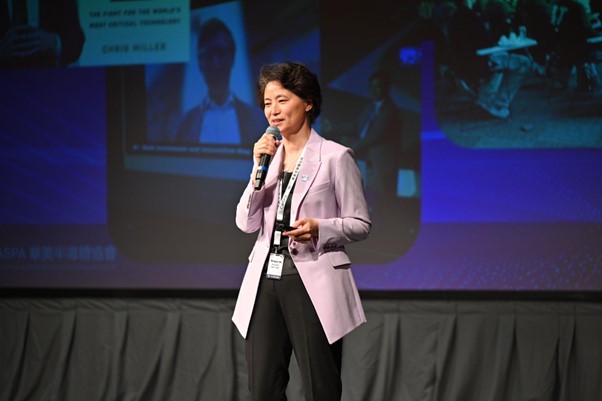
CASPA President Mingyu Qu (2023-2024) expressed in her opening speech that CASPA has always been committed to innovation and community building. This year’s event attracted over 3,000 registered participants and featured technical workshops, career development sessions, an entrepreneur forum, and a Women in Semiconductor Open Day, demonstrating deep insights into emerging technologies. Qu also highlighted that over 100 new lifetime members have joined CASPA, strengthening the organization’s vitality. She thanked all sponsors and members for their support in making CASPA a more stable force in promoting AI and semiconductor innovation.
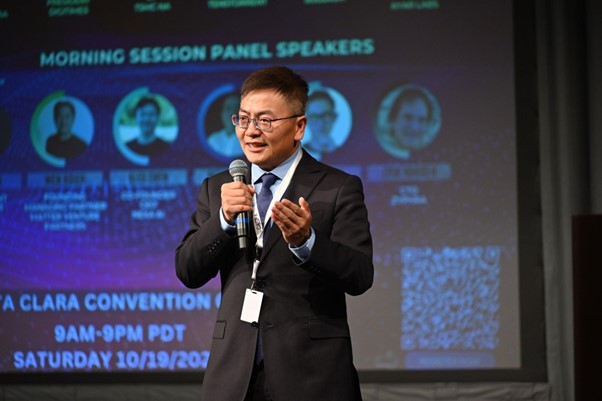
New CASPA President Dr. Zhibin Xiao, also Chair of the 2024 CASPA Annual Conference Dinner Banquet Committee, mentioned in his speech that the fusion of AI and semiconductor technology is driving transformation across industries at an unprecedented speed amid the wave of global technological change. Democratizing AI is not only a mission of tech companies but also a call of the times, which will enhance productivity across industries and create new business opportunities. CASPA has always been committed to building a high-quality exchange platform for the global semiconductor and AI industries, bringing together top experts and innovators from various fields. As a leader in the industry, CASPA not only witnesses the leap in technology but also plays a crucial role in promoting its popularization, supporting entrepreneurship, and fostering international cooperation. Today’s conference is the best representation of the importance of this platform
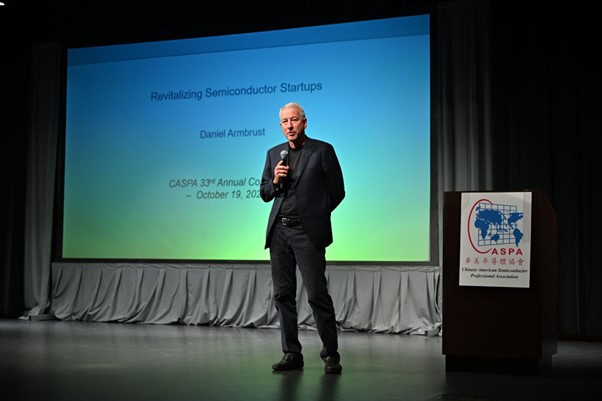
In the morning session, Dan Armbrust, Co-founder of Silicon Catalyst, gave a keynote speech titled “ Revitalizing Semiconductor Startups –The investment and innovation landscape in the CHIPS Act Era”. As a seasoned entrepreneur and investor in the industry, Dan Armbrust provided an in-depth analysis of the impact of rapid AI advancements on startups. He discussed the opportunities and challenges AI startups face and emphasized how innovation, proper market positioning, and strategic investment can drive growth. He particularly pointed out that the democratization of AI presents unprecedented opportunities for small and medium-sized enterprises, which is a key focus for future investments.
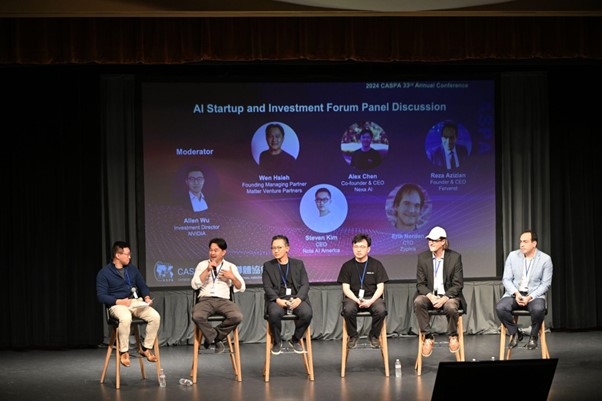
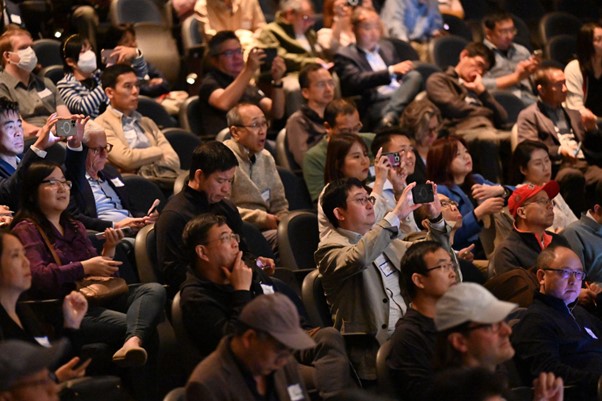
Allen Wu, Investment Director at NVIDIA, moderated a panel discussion on “AI Startups and Investment”. Panelists included Wen Hsieh, Founding Partner of Matter Venture Partners; Alex Chen, Co-founder and CEO of Nexa AI; Reza Azizian, Founder and CEO of Ferveret; Steven Kim, CEO of Nota AI America; and Erik Norden, CTO of Zyphra. They discussed the development paths for AI startups in the semiconductor and related tech fields, focusing on how to attract capital and how AI can create value across industries. The participants shared their investment experiences and market insights, offering valuable perspectives to the audience.
In the afternoon, several keynote speakers delivered talks on cutting-edge technologies and industry trends in their respective fields:
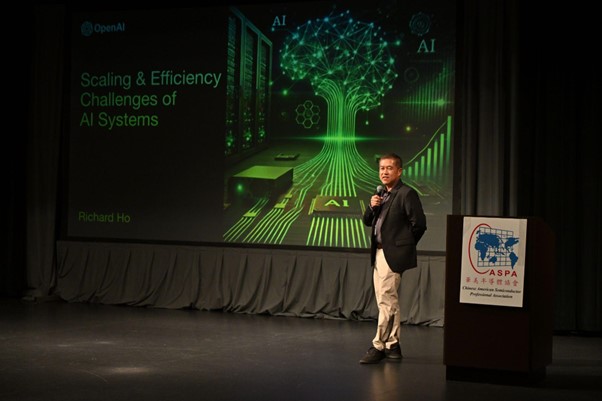
Richard Ho, Head of Hardware at OpenAI, gave a presentation titled ” Navigating Scaling & Efficiency Challenges of AI Systems”, focusing on the development of AI hardware and how to optimize it to support large-scale AI model training and inference. He also introduced OpenAI’s innovations in hardware design to promote the broader application of AI technology.
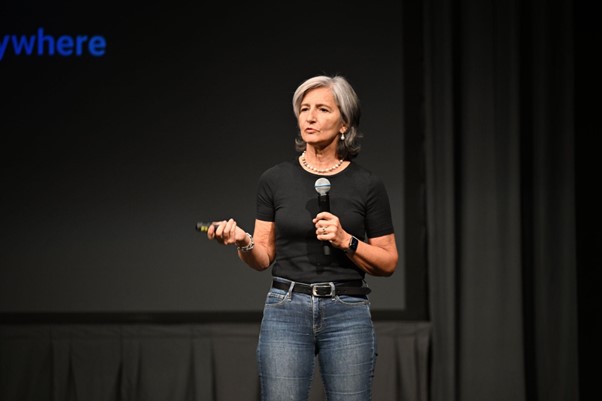
Alessandra Costa, Senior Vice President at Synopsys, presented on “Powering Innovation in the Era of Pervasive Intelligence”, discussing how to drive innovation and empower future AI applications in an era where intelligence is ubiquitous.
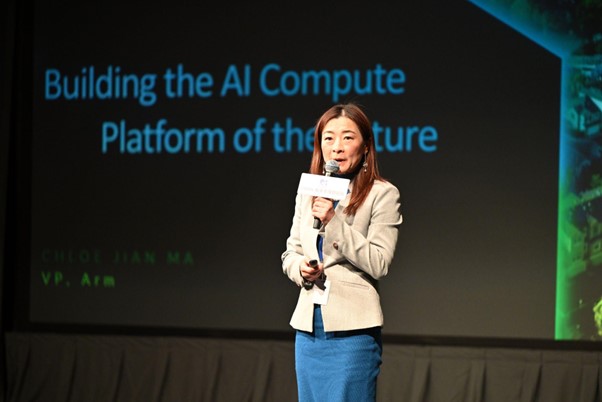
Chloe Ma, Vice President at ARM, delivered a talk on “Building the AI Compute Platform of the Future”, analyzing ARM’s AI computing platform design and future development directions to enable more efficient AI processing capabilities.
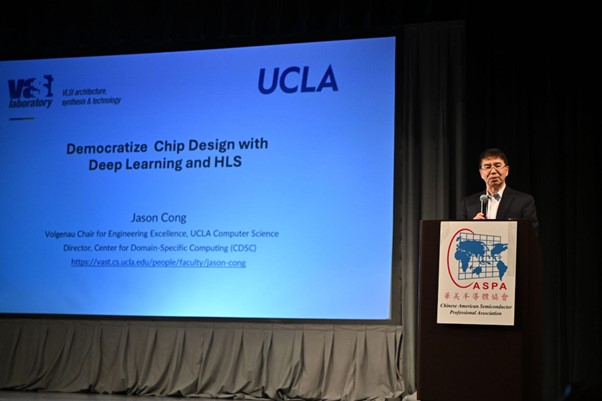
Jason Cong, Professor at UCLA, shared his insights on “Automating Chip Design with Deep Learning and HLS”, exploring how the combination of AI and semiconductor technology is revolutionizing chip design processes and pushing the development of chip technology.
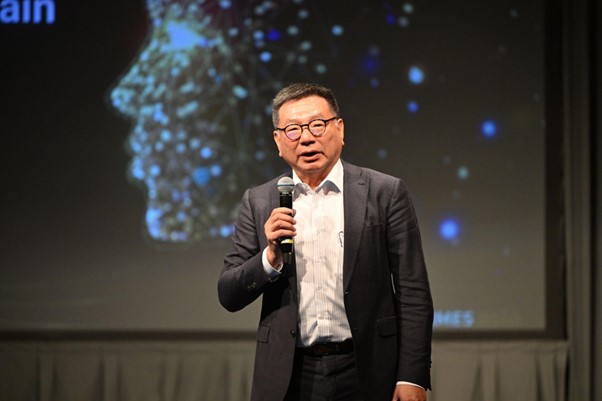
Colley Huang, Founder and President of DIGITIMES, spoke on “AI-Driven Semiconductor Industry: Perspectives from the Asian Supply Chain”, offering insights into the critical role and future opportunities of the Asian supply chain in the AI-driven semiconductor industry.
These presentations covered key areas of AI and semiconductor technologies, providing attendees with rich knowledge and insights into future industry trends.
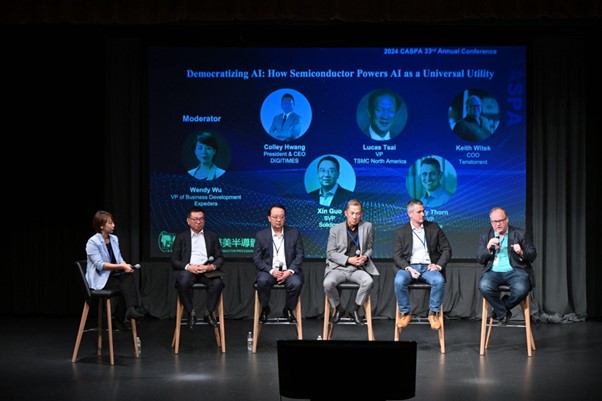
The panel discussion on ” How The Semiconductor Industry Powers AI as A Universal Utility “ was moderated by Wendy Wu, VP of Business Development at Expedera. The panel included Colley Huang, Founder and President of DIGITIMES; Lucas Tsai, Vice President of TSMC North America; Keith Witek, COO of Tenstorrent; Xin Guo, Senior Vice President of Solidigm; and Terry Thom, VP of Ayar Labs. Together, they discussed how to promote the popularization of AI technology, break down technical barriers, and ensure it benefits a broader range of businesses and individuals.
The dinner banquet marked the highlight of the conference, with various exciting sessions. In an elegant atmosphere, guests from all walks of life gathered to enjoy a meticulously prepared dinner. A notable moment was the leadership transition of CASPA (2024-2025). Mingyu Qu, outgoing President (2023-2024), handed over the association’s jade seal wrapped in yellow to the new President, Dr. Zhibin Xiao. Both the outgoing and incoming presidents reflected on CASPA’s achievements over the past year and outlined future visions, symbolizing that CASPA will continue to lead the industry forward, embracing new opportunities and challenges.
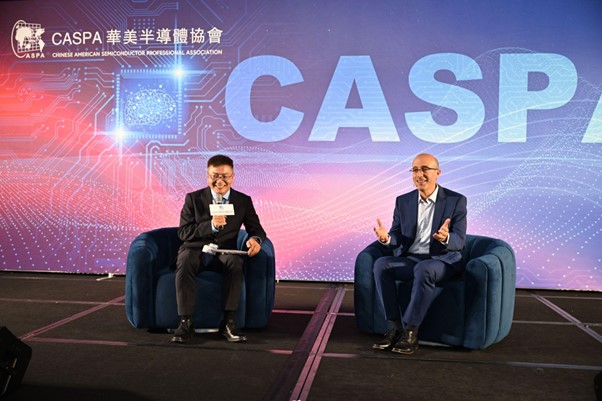
The centerpiece of the dinner was a fireside chat hosted by Dr. Zhibin Xiao with special guest Charlie Kawwas, President of Broadcom. They had an in-depth discussion on the development prospects of AI and the semiconductor industry, with Dr. Kawwas sharing Broadcom’s vision for AI connectivity, its strategies for winning customers, the importance of mentorship in career development, Broadcom’s acquisition strategy, and talent strategies. Dr. Kawwas’ humor and sharp insights were well-received by the community, and his Chinese slogan for the future of AI infrastructure—”Openness, Scalability, Efficiency”—resonated with the audience, leading to enthusiastic applause.
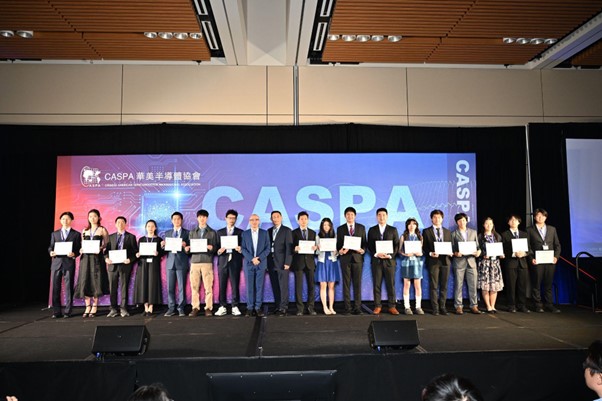
The evening also featured the 2024 CASPA Scholarship Awards ceremony, recognizing outstanding young talent in the fields of academics and innovation, highlighting CASPA’s commitment to nurturing the next generation of semiconductor professionals.
The CASPA 2024 Annual Conference concluded in an atmosphere filled with music and laughter. This year’s theme, “Democratizing AI: How the Semiconductor Industry Powers AI as a Universal Utility”, deeply explored the global popularization and application of AI technology, especially the path to AI democratization led by the semiconductor industry. It showcased how semiconductor technology lowers the barriers to AI and promotes its broad use, allowing small and medium-sized enterprises and individual developers to innovate and transform industries. This theme has set a new milestone for the widespread adoption of AI technology and injected tremendous momentum into the future development of the AI industry. We look forward to the 2025 conference, which promises to bring even more exciting content and innovative opportunities, once again gathering global wisdom to push AI into broader and deeper application fields.
